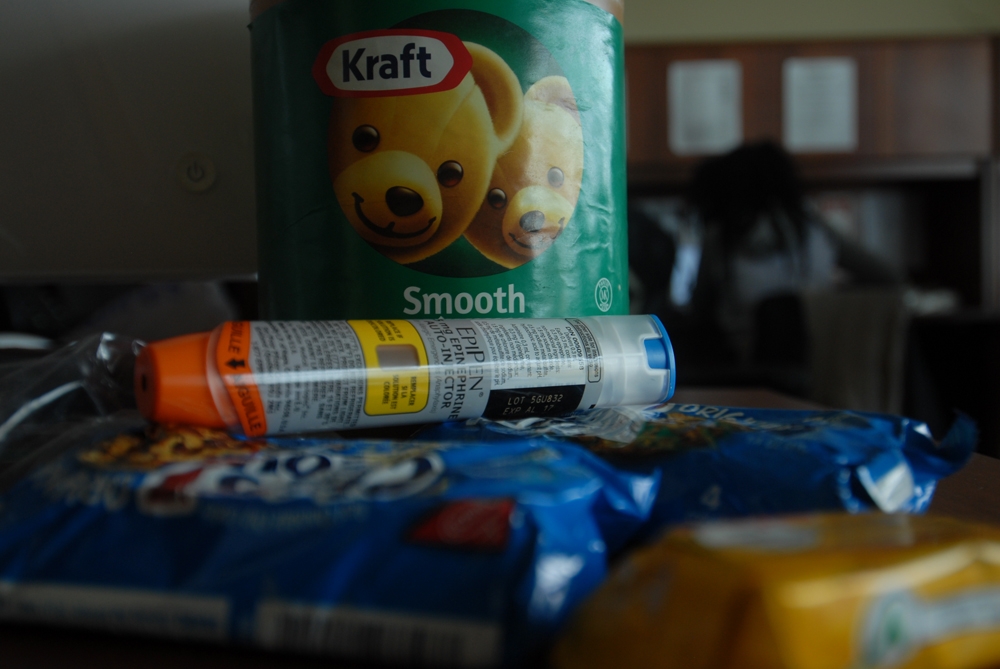Victoria Goldberg | Editor-in-Chief
Featured image: The increased prices of EpiPens in the United States were not felt in Canada. | Victoria Goldberg
Stuffy nose, sneezing and drowsiness are all symptoms that may have annoyed you during peak allergy season in the springtime. For some, allergies are a potentially fatal condition that persist year-round. An effective and popular immediate treatment for dangerous allergy attacks is the EpiPen. This mechanical device injects epinephrine to stop anaphylaxis, an adverse reaction that results in intense swelling of the tongue, throat and other parts of the body.
There is no Canadian patent for an epinephrine autoinjector, and there is only one available in Canadian drug stores: the EpiPen. That is, until 2017, when Kaléo is set to reintroduce Auvi-Q, their version of the autoinjector, according to a recent press release. Kaléo previously released Auvi-Q, known as Allergject in Canada, in 2013.
Kaléo recalled its products in Canada and the United States in late 2015 due to the potential of administering an inaccurate dosage. In Canada, only nine suspected device malfunctions were reported, but none have been confirmed. No fatalities resulted from these malfunctions.
The dosage of epinephrine is extremely important, as it is calculated based on the age and weight of the recipient. In many cases, a second or third dosage is required before emergency care is provided.
However, for American patients, the reintroduction of competition is not optimistic. Much like Mylan Pharmaceuticals, the distributor of the EpiPen in the United States, Kaléo has increased the price of lifesaving devices, including a device used to reverse opioid overdoses, by more than 650 per cent. When it was first introduced to the market, the price of an Auvi-Q two-pack was about $200 USD, similar to EpiPen’s two-packs. In 2015, the Auvi-Q was sold for $500 USD.
In a very niche market, the EpiPen has managed to increase its prices to $600 USD for a two-pack of the device, up from $100 USD in 2007. The increase in price has reportedly “changed over time to better reflect important product features and the value the product provides,” according to a public release from Mylan.
Comparatively, an EpiPen two-pack costs $69 in the United Kingdom, $181.81 in Canada and $210.21 in Germany, with some variations due to pharmaceutical dispensing fees, according to a recent analysis by the consumer watchdog Public Citizen. Canadian allergy sufferers do not have to fret, however, as Canadian EpiPen distributor Pfizer Canada has assured consumers that they have no plans to change the pricing.
“Although Epipen is not directly regulated by the Patented Medicine Price Review Board since it is not a patented drug, provincial constraints still limit our actions with respect to [price] increases,” said Manon Genin, manager of corporate affairs at Pfizer.
The increase in prices has seen many Americans shopping north of the border, purchasing EpiPens from Canadian pharmacies such as the online distributor, CanadaDrugs.com. While a prescription is not required, shopping around for medication is problematic. Regulations differ by country, and in recent investigation, the National Association of Board of Pharmacy found that only four per cent of 11,000 online drug outlets were operating according to United States laws. Since medication sold online is not regulated by governing bodies, products sold may not have the correct amount of active ingredients and may be contaminated or even expired.
Americans and Canadians alike are faced with the same problematic issue—the privatization of a public good. In a case of life or death, private companies are seeking their private interests as opposed to offering the good for free, or at a reduced price. There are several programs in the United States that help with the co-payment of epinephrine autoinjectors, but many don’t take into account that many patients, particularly children, need several devices. The York Region District School Board requires two devices for children with known allergies, one of which must be kept in the administration office.
Prices and release dates have yet to be published for Kaléo’s rebranded Auvi-Q autoinjectors. Drug manufacturers have to agree with local review boards on pricing before production would even begin.
“I think where companies are very sensitive to Canadian price regulation, they know the Canadian price is going to be lower, [so] they may not launch in Canada at all,” said Stephen Frank, senior vice-president of policy development and health at the Canadian Life and Health Insurance Association.




